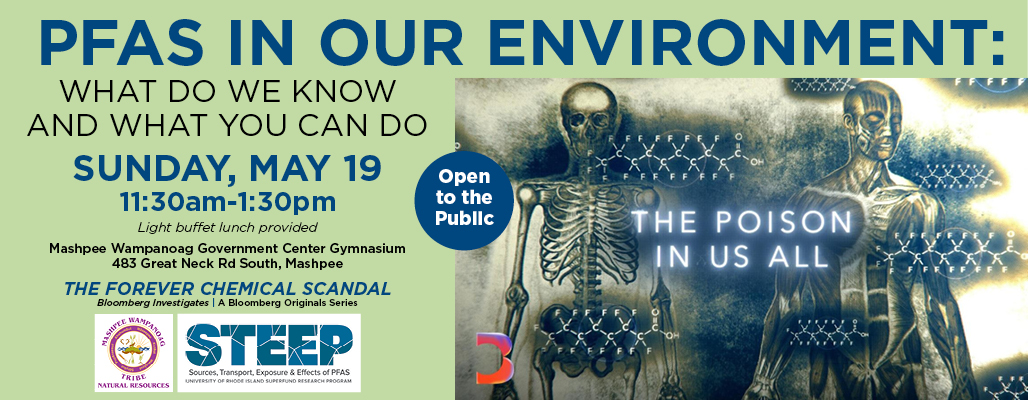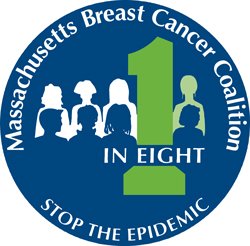FOR IMMEDIATE RELEASE: Thursday, May 9, 2024

Media Contact: Alexandra Goho, goho@silentspring.org
May 19: Mashpee Wampanoag Tribe and STEEP to host film screening and panel on PFAS in the environment
STEEP scientists will discuss their latest findings on PFAS in fish and shellfish on Cape Cod and the potential impacts on Mashpee Wampanoag community members
Hyannis, MA – The Mashpee Wampanoag Tribe and STEEP invite the public on Sunday, May 19 at 11:30 a.m. to a film screening and panel discussion about PFAS in the environment on Cape Cod. The event will feature a 50-minute documentary film called “The Poison In Us All” produced by Bloomberg Investigates. The film chronicles how this persistent and dangerous class of chemicals found their way into every corner of the planet and every aspect of our daily lives. The screening will be followed by a panel discussion with members of the Tribe and the STEEP science team, including a presentation of the team’s results from PFAS testing in locally caught fish and shellfish on the Upper Cape. The program will conclude with a Q&A session with the audience.
The event is FREE and open to the public. All are welcome!
Details below.
_____
WHAT: “PFAS in our environment: What do we know and what can you do?”
WHEN: May 19, 2024, 11:30 a.m. to 1:30 p.m.
WHERE: Tribal Government Center gymnasium, 483 Great Neck Rd South, Mashpee, MA 02649
Program:
- 11:30 a.m.: Welcome, light lunch available
- 11:45 a.m.: Film screening – “The Poison In Us All” by Bloomberg Investigates (48 min)
- 12:35 p.m.: Results of PFAS testing of fish and shellfish near Mashpee
- 12:50 p.m.: Panel Discussion and Q&A (Moderator: Dr. Emily Diamond, Assistant Professor, University of Rhode Island)
- 1:30 p.m.: Wrap up
Panelists:
- Dr. Rainer Lohmann, Professor, University of Rhode Island
- Dr. Laurel Schaider, Senior Scientist, Silent Spring Institute
- Heidi Pickard, PhD Candidate, Harvard University
- Jason Steiding, Director of Natural Resources, Mashpee Wampanoag Tribe
Background: PFAS (per- and polyfluoroalkyl substances) are a class of chemicals that companies add to a wide variety of consumer products to make them non-stick, waterproof, and stain-resistant. The chemicals can be found in products such as stain-resistant carpets and upholstery, waterproof apparel, floor waxes, non-stick cookware, greaseproof food packaging, dental floss, and some cosmetics. They are also used in firefighting foams for putting out fuel fires. People can be exposed to these chemicals from direct contact with products, or through the air they breathe or the food they eat.
They can also be exposed through contaminated drinking water. The chemicals find their way into the environment from industrial sites, waste disposal, and fire training areas where PFAS are used in firefighting foams. On Cape Cod, PFAS have been detected in groundwater, ponds, and rivers, and the highest levels in groundwater have been found close to fire training areas at Joint Base Cape Cod and in Hyannis.
About STEEP: The Sources, Transport, Exposure and Effects of PFAS (STEEP) Superfund Research Program is a multi-institutional project funded by the National Institute of Environmental Health Sciences. Through STEEP, researchers at the University of Rhode Island, Harvard University, and Silent Spring Institute are studying PFAS on Cape Cod — how these chemicals move through our environment, how we are exposed through drinking water and diet, and how they affect our health. Local project partners include the Massachusetts Breast Cancer Coalition and the Sierra Club Cape Cod Group. The STEEP community engagement team has also been working with the Mashpee Wampanoag Tribe on various initiatives to understand how PFAS affect the Tribal community and to educate community members on reducing their exposures.
For more information about STEEP, visit: https://web.uri.edu/steep/
—
Alexandra Goho
Director of Communications
Silent Spring Institute
Leading environmental health research to identify opportunities for breast cancer prevention
